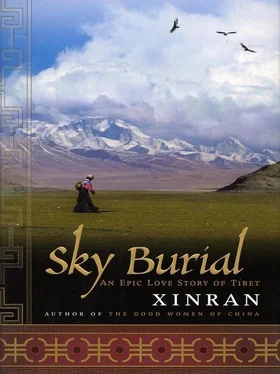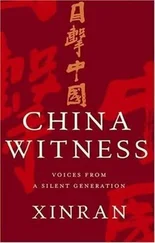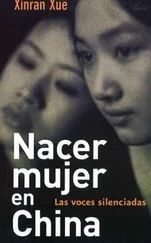“’Neither I nor the other Chinese have come here to harm you. All we wanted to do was bring Chinese knowledge to you, to improve your lives, as Princess Wencheng did more than a thousand years ago. She taught you how to weave, how to grow crops and treat your illnesses. We wanted to tell you how to use new materials to improve your tents, how to make new sorts of leather goods, how to make your animals grow fatter. We wanted to help you conquer the demons of sickness that cause you pain. Although we carry weapons, we don’t want to use them against you. We only use them like you use your knives, to protect ourselves from evil people.
“‘I did what I did yesterday to save one of your lamas, who had not died, as you believed. However, I have realized that I made a mistake in killing one of your sacred messengers. I wish to atone for this mistake. I will sacrifice my own life to call the vultures back. According to your religion, the sacred vultures will not eat a demon. After I die, I ask you to cut my body up with your knives, and see for yourselves whether we Chinese are the same in death as you Tibetans. If the spirits send down their vultures as a sign, please believe that we Chinese see them as our friends also, that hatred and bloodshed are the work of demons, that in the eyes of the spirits we are all brothers!’”
Qiangba looked up at the sky.
“Your husband then picked up his pistol from the ground and, facing toward his home in the east, shot himself through the head.”
The hermit paused. Wen, too, gazed at the sky. After a few moments of respectful silence, he continued with his story.
“Overwhelmed by grief, I limped back to the camp to tell the commander what had happened. He rushed to the place I had described, the other soldiers hard on his heels. But it was impossible for him to rescue your husband’s body from the vultures. The men had dismembered it with their knives and the earth was covered in hungry birds.
“Perhaps, in the menba’s body, they could taste the sincerity of his desire for peace,” said Qiangba.
“Perhaps there was something magical in the appearance of so many birds. Whatever the reason, the vultures lingered there for a long time, wheeling and circling the summit of the mountain.
“The soldiers saw the Tibetans watching them respectfully from a distance. By your husband’s action, they had realized that the Chinese could also be carried into the sky by the sacred birds. His death had taught them that Chinese flesh and Chinese feelings were identical to theirs. As the soldiers made their way back to the camp, khata scarves lined their path, performing a memorial dance under the blue sky and white clouds.
“The commander continued onward with his troops. I made the journey back to my monastery. Before we parted, the instructor asked if I would take care of Kejun’s package and see if I could find an honest traveler who would take it to a woman called Shu Wen in Suzhou. He was worried that he and his men would not return to China alive. I promised him that I would do as he asked. When I returned to the monastery, I beseeched the abbot to allow me to wander the countryside singing of the Chinese menba who had saved my life and washed away the hatred between Tibetans and Chinese with his own. Since that time, no blood has been shed between Tibetans and Chinese in this area. Try as I might, I never found a traveler I trusted to bring you this parcel. Now, instead, you have come to me.”
HAVING LISTENED to the hermit’s story, Wen prostrated herself before the crowd of onlookers with their fluttering khata scarves, and prayed: “Om mani padme hum.”
It was time for Wen to leave the Hundred Lakes, snowcapped Anyemaqen, and the other mountains of Qinghai. For years she had wandered in this region. Its grasslands, waters, and sacred mountains filled her soul. Here she had sampled all the joys and sorrows of human life. Here her love for Kejun had grown in intensity. Here she had found her spiritual home. Though her body was leaving, her spirit would remain in the place that held her dead husband. As she prepared for her journey, her heart was like still water; any ripples of longing or sadness had been gently smoothed away by the influence of the spirits. Wen knew that in the months and years to come, at all times and in all places, she would be like a kite, connected by an invisible thread to Mount Anyemaqen.
She divided in two her book of essays, its pages overwritten with all her words of longing. One half she would carry back with her to China, the other half she would leave with Old Hermit Qiangba. In this way, a part of Kejun and a part of herself would live on in Tibet.
It was decided that Wen, Zhuoma, and Tiananmen should make their way to Lhasa, the most ancient and holy city of Tibet. There they could seek out representatives of the Chinese army to see what was known about Kejun’s fate. They could also inquire about transport to China. Zhuoma was determined to make one final journey to Wen’s homeland, and Tiananmen wished to see the place that had been Zhuoma’s inspiration, before returning to his monastery. One of the families camped by the lake promised that they would seek out Gela ’s family and take a message to them.
THE JOURNEY south was arduous, their path a lonely one. However, once they had crossed over the Tanggula mountain range, they met many more travelers on their route, which took them into more populated land. To their surprise, they began to notice Chinese faces at the markets and fairs. There were restaurants and shops with signs written in Chinese characters. Tiananmen was particularly taken aback by what they saw. It was as if they had walked into another world-or century. One day they even found themselves in a village square where young men and women dressed in multicolored combinations of Chinese and Tibetan clothing strutted up and down to music. One of the onlookers told Wen that this was a “fashion show.”
Wen had never expected to find so many Chinese settled here, with families and businesses. She had never imagined that all the terror and bloodshed she had witnessed would have resulted in this. So much had been happening while she had been in the wilderness. What did the Chinese settlers make of this mysterious country and its culture? Part of her longed to be able to engage some of these people in conversation. Another part of her held back, remembering how difficult it had been when she had talked to Chinese people at the Dharmaraja festival.
WHAT THEY had seen on their journey was nothing compared to the teeming streets of Lhasa, the huge white Potala Palace looming over them. As the three friends made their way into the city, they felt faint with the hustle and bustle, the unfamiliar noise and smells. Wen was overwhelmed with a huge nostalgia for her homeland. Except for the temples and the people in Tibetan dress, she felt she could almost be back in China, especially in the streets of the Barkhor market district, where Chinese and Tibetan traders jostled with each other to hawk their wares. Tiananmen was utterly bemused by what he saw. He rubbed the back of his head in astonishment. To him the uses of all these exotic objects were a complete mystery. Zhuoma seemed partly dismayed, partly exhilarated by the scene.
“It hardly seems like Tibet,” she said.
Tiananmen pointed at a group of lamas at a stall shouting out the religious articles they had for sale-rosaries, prayer flags, jewel-encrusted yak skulls, and goods for offerings.
“What scriptures are they chanting?” he asked. Although Wen and Zhuoma knew the lamas were not praying, they were just as surprised as him to see lamas engaging in trade.
In the market, Zhuoma bartered a necklace of precious beads for a pen for Wen, a new robe for Tiananmen, and a scarf and some ready money for herself. Over the years, Zhuoma’s ancestral jewelry had become greatly depleted, but she still owned just enough to allow the three of them to travel to China.
Читать дальше












